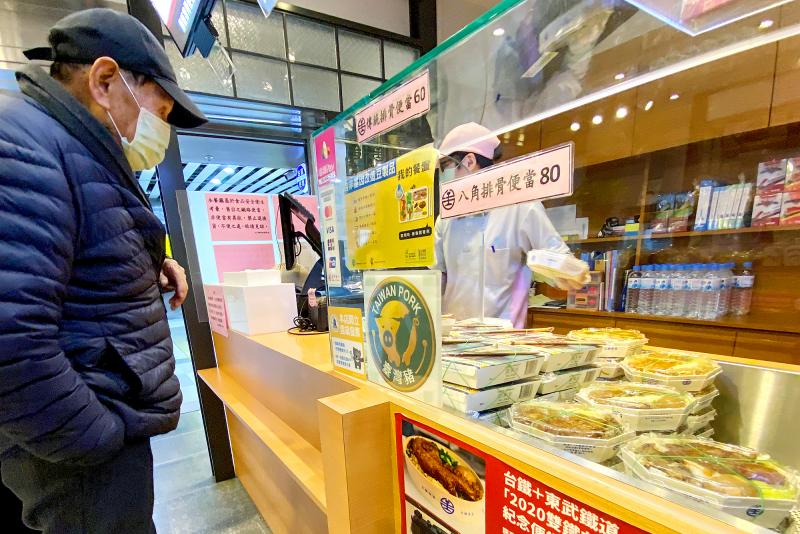Taiwanese restaurants and hotel chains said that they are under pressure to raise prices to reflect expected increases in the price of locally produced pork amid health concerns about pork containing traces of ractopamine.
However, there are also concerns that doing so could scare away potential customers.
A policy allowing imports of US pork containing the animal feed additive came into effect on Friday. Local producers are not allowed to use ractopamine.

Photo: CNA
Several major restaurant chains in Taiwan, such as Wowprime Corp (王品), Tai Tong Food & Beverage Group (TTFB, 瓦城泰統集團), Hi-Lai Foods Co (漢來美食), Bafang Yunji International Co (八方雲集) and Tofu Restaurant Co (豆府), as well as Formosa International Hotels Corp (晶華國際酒店集團) and LDC Hotels & Resorts Group (雲朗觀光集團), said they are using only pork produced in Taiwan or pork from countries that do not use ractopamine.
For example, Bafang Yunji, which operates 1,000 dumpling restaurants across Taiwan, said that it only uses Taiwanese pork at its outlets in central and southern Taiwan.
Its northern Taiwan stores mainly use locally produced pork, but have imported a “small amount” of ractopamine-free pork from Denmark.
Meanwhile, Wowprime, which operates 21 restaurant brands with a total of 280 stores nationwide, said that most of its pork is from Taiwan, although it has also imported some from Denmark, as well as lard from Japan.
TTFB said that none of its restaurants use US pork products and clearly label the country of origin in accordance with government regulations.
However, several restaurant and hotel chain operators said they might be forced to raise their prices soon, as many Taiwanese pork vendors are planning to raise their prices because the new policy is expected to boost demand for locally produced pork.
A restaurant chain operator, who asked to remain anonymous, said that although most imported pork does not contain ractopamine, almost all restaurants believe the only way to convince customers of the safety of their products is to use only Taiwanese pork.
This would lead to significantly higher domestic pork prices and increase restaurants’ costs, but they are reluctant to increase prices as that would affect their businesses, the operator said.
“We are caught in a dilemma,” they added.
Another senior manager at a restaurant chain said that despite the central government’s policy, many local governments continue to ban ractopamine.
The manager, who also asked to remain anonymous, called on the government to come up with a single nationwide standard regarding the use of ractopamine so that restaurant operators would have clear guidelines to follow.
Ractopamine is banned in the EU and China because of concerns over safety for both animals and humans. The US allows the use of ractopamine, and had said that Taiwan’s zero-tolerance policy impeded trade.
Since the new policy was announced on Aug. 28, a number of local governments have said that they would continue to ban ractopamine in pork.
However, the Cabinet has said that local government bans have no validity.

CHIP WAR: Tariffs on Taiwanese chips would prompt companies to move their factories, but not necessarily to the US, unleashing a ‘global cross-sector tariff war’ US President Donald Trump would “shoot himself in the foot” if he follows through on his recent pledge to impose higher tariffs on Taiwanese and other foreign semiconductors entering the US, analysts said. Trump’s plans to raise tariffs on chips manufactured in Taiwan to as high as 100 percent would backfire, macroeconomist Henry Wu (吳嘉隆) said. He would “shoot himself in the foot,” Wu said on Saturday, as such economic measures would lead Taiwanese chip suppliers to pass on additional costs to their US clients and consumers, and ultimately cause another wave of inflation. Trump has claimed that Taiwan took up to

A start-up in Mexico is trying to help get a handle on one coastal city’s plastic waste problem by converting it into gasoline, diesel and other fuels. With less than 10 percent of the world’s plastics being recycled, Petgas’ idea is that rather than letting discarded plastic become waste, it can become productive again as fuel. Petgas developed a machine in the port city of Boca del Rio that uses pyrolysis, a thermodynamic process that heats plastics in the absence of oxygen, breaking it down to produce gasoline, diesel, kerosene, paraffin and coke. Petgas chief technology officer Carlos Parraguirre Diaz said that in

Japan intends to closely monitor the impact on its currency of US President Donald Trump’s new tariffs and is worried about the international fallout from the trade imposts, Japanese Minister of Finance Katsunobu Kato said. “We need to carefully see how the exchange rate and other factors will be affected and what form US monetary policy will take in the future,” Kato said yesterday in an interview with Fuji Television. Japan is very concerned about how the tariffs might impact the global economy, he added. Kato spoke as nations and firms brace for potential repercussions after Trump unleashed the first salvo of

SUPPORT: The government said it would help firms deal with supply disruptions, after Trump signed orders imposing tariffs of 25 percent on imports from Canada and Mexico The government pledged to help companies with operations in Mexico, such as iPhone assembler Hon Hai Precision Industry Co (鴻海精密), also known as Foxconn Technology Group (富士康科技集團), shift production lines and investment if needed to deal with higher US tariffs. The Ministry of Economic Affairs yesterday announced measures to help local firms cope with the US tariff increases on Canada, Mexico, China and other potential areas. The ministry said that it would establish an investment and trade service center in the US to help Taiwanese firms assess the investment environment in different US states, plan supply chain relocation strategies and